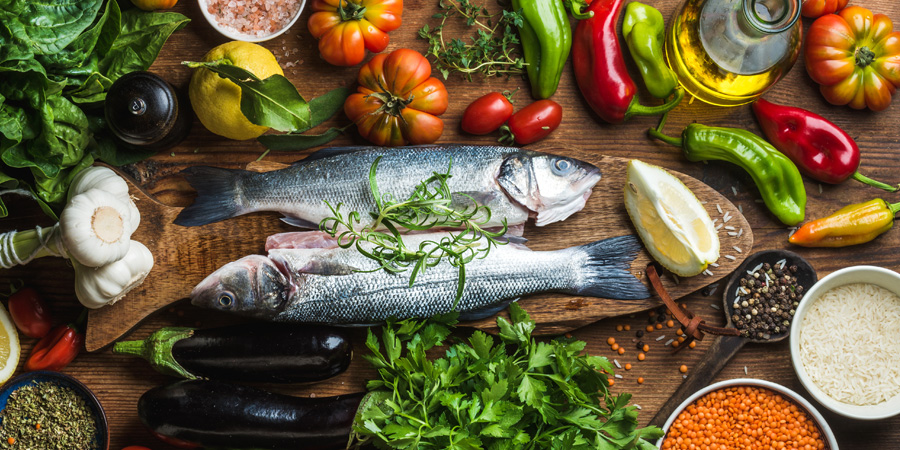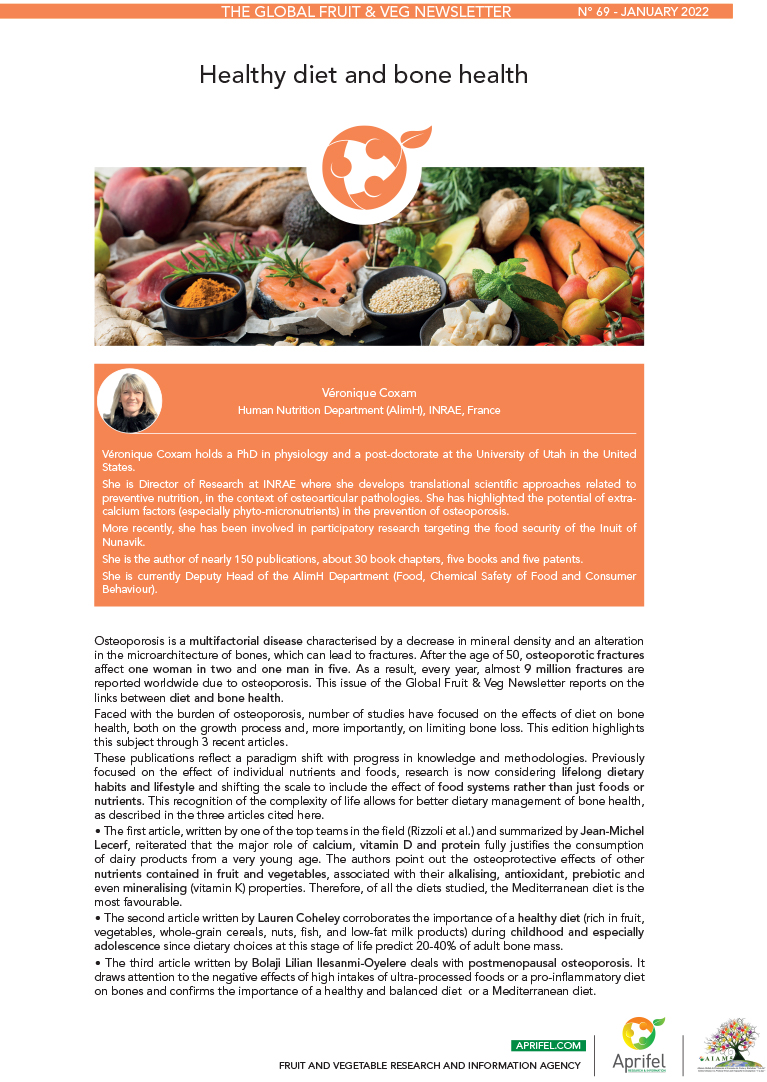Nutrient intakes and bone health : a review stresses the importance of a healthy, varied diet

Osteoporosis is a multifactorial disease that affects over 20% of women aged 50 and over in Europe (Borgström, 2020). In addition to genetic and hormonal factors and obviously age, there are many lifestyle-related factors that come into play, namely physical activity and nutrition (Rizzoli, 2010). A recent literature review conducted by one of the foremost teams in the area of bone health and nutrition (Rizzoli, 2021) provides a comprehensive overview of this issue. It points out the importance of adequate protein, calcium, vitamin D, fruit and vegetable intakes.
The authors examined the role of nutrients, food and certain diets (in the broad sense), using a rigorous nutritional and scientific approach.
Dairy products : a positive effect on bone mineral density and fracture risk
Dairy products rank first in terms of evidence. Not consuming them is associated with an increased risk of osteoporosis and fractures, regardless of age (Opotowsky, 2033; Goulding, 2004; Konstantinowicz, 2007). Observational studies have shown that high intakes are associated with increased bone mineral density and bone strength and reduced fracture risk (Matkovic, 2004). The clearest benefit is observed for fermented dairy products (Ong, 2020). This is not due to calcium alone but rather to a food matrix effect, because for the same intake of calcium, taking calcium supplements is less effective in terms of bone mineral density than eating cheese (Cheng, 2005). Indeed, high calcium intakes increase bone mineral density in children and adolescents in particular, although no reduction in fracture risk has been demonstrated (Winzenberg, 2006).
Vitamin D also plays a key role in bone metabolism. Vitamin D and calcium supplementation reduces fracture risk in at-risk and elderly subjects (Yao, 2019).
The role of protein has been established in prospective epidemiological studies showing that high intakes are associated with reduced fracture risk, especially for milk protein. Calcium-protein and calcium-vitamin D-protein interactions seem favourable.
Fruit and vegetables : regular consumption reduces fracture risk by 8%
Eating fruit and vegetables is also beneficial for bone mineral density. Observational studies have shown an 8% reduction in fracture risk when fruit and vegetables are consumed on a regular basis (Brondani, 2019). Several mechanisms of action are described as explaining this protective effect :
- the alkalising action of fruit and vegetables, altering the acid-base balance of the body,
- an antioxidant effect, associated with the presence of vitamin D, beta-carotene and vitamine K in fruit and vegetables,
- a prebiotic effect on the microbiota, likely to increase calcium absorption.
In fact, studies underline that the benefits associated with vitamin A depend on the source, because only beta-carotene has been shown to be inversely associated with fracture risk (Charkos, 2020). Playing a role in collagen synthesis by osteoblasts, and inhibiting osteoclastic activity via its antioxidant effect, vitamin C was associated with a sharp reduction in the risk of femoral neck fracture in interventional studies (Zeng, 2020). Vitamin K is also a candidate but its effect, if there is one, is only modest.
The Mediterranean diet : favourable for bone health
Lastly, the effects of several diets on the risk of osteoporosis have been studied. Vegetarian and especially vegan diets have an extremely harmful effect, mitigated by high calcium intakes (Ho-Pham, 2009). Weight-loss diets also have a harmful effect, mitigated by protein, calcium and vitamin D supplementation and physical activity (Zibellini, 2015; Paccou, 2021). The Mediterranean diet is the most favourable when it comes to bone health.
In addition to the widely established beneficial role of calcium and vitamin D, this work once again emphasised the importance of a healthy, varied diet rich in fruit and vegetables for the prevention of osteoporosis.
- 0.8 g of protein/kg/day (up to 1.3 g for the elderly)
- 800 mg to 1 g of calcium/day
- 800 to 1000 IU of vitamin D
- Five servings of fruit and vegetables, and a small amount of salt (≤ 2.5 g/day)
To prevent osteoporosis, the authors recommend a diet supplying:
They also recommend a Mediterranean diet

